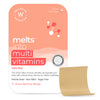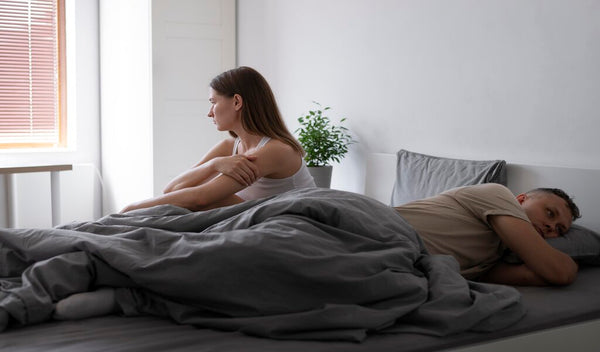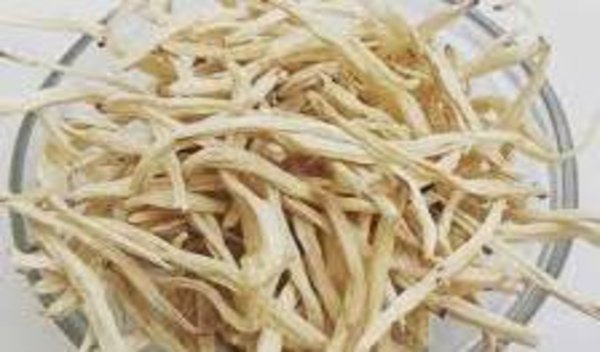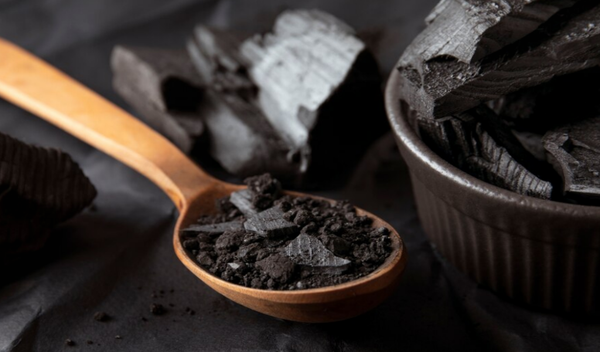Trying to keep up with this fast-paced life can take a toll on anyone's health and well-being. One area that's most affected is passion in the bedroom. After a long day at work, taking care of the kids, or simply trying to juggle numerous responsibilities, it's normal for women to experience a decrease in desire. This not only takes a toll on your physical health, but feelings of guilt for not being able to reciprocate with the same enthusiasm can take a toll on your mental health as well. If you can relate to the above scenario, this blog is for you.
Women’s sexual desires may fluctuate across different phases of life, including puberty, pregnancy, lactation, and post-menopause. To address the issue of low libido in females, an ancient medicinal herb called Ashwagandha has shown potential benefits. Referred to as "Rasayana" in Ayurveda, meaning rejuvenation, Ashwagandha acts as a stimulant. The name "Ashwagandha" is derived from its distinct smell, resembling that of a horse, with "Ashwa" meaning horse and "Gandha" meaning smell. It is believed that consuming this herb provides the strength and power of a horse.
While Ashwagandha is well-known in Ayurveda as an adaptogenic and antiviral herb, its benefits extend beyond treating viral infections, improving mood, and increasing focus. It also exhibits excellent aphrodisiac properties, particularly for females.
Sexual Desires / Libido in Women
Certain health issues can be so personal that we often hesitate to seek help due to feelings of embarrassment. However, neglecting these issues can result in further physical or mental distress. One such issue is low libido. It's completely normal to have fluctuations in sexual desire, experiencing days of disinterest followed by days of craving intimacy. However, a persistent absence of sexual fantasies, thoughts, or desires for sexual activity, which causes distress in the relationship, may indicate a condition called Hypoactive Sexual Desire Disorder (HSDD). The good news is that this condition is treatable, but it's important to consult your doctor for proper guidance.
On the other hand, if you still have desire but notice a decrease in your arousal levels compared to before, there are certain herbs, lifestyle changes, and supplements that may assist you in this matter. It's worth exploring these options to help improve your situation.
Factors Affecting Female Libido
-
Hormonal imbalance:
-
Physical fatigue:
-
Psychological conditions:
-
Reduced sensation:
Inadequate blood flow to the genital area may lead to an inability to achieve orgasm. Poor blood circulation, a lack of sex hormones (estrogen, progesterone, and testosterone), or dryness or insufficient lubrication can make the process of intercourse a painful and unpleasant experience, thereby causing arousal problems. Lifestyle habits such as smoking may also decrease blood flow to the genitals due to damaged blood vessels, further contributing to a decline in sexual desires.
Apart from the above reasons, certain classes of medications, like antidepressants and antihypertensives, may be responsible for the decline in libido in women. Certain conditions such as aging, diabetes, cardiovascular disease, obesity, arthritis, or cancer, and lifestyle habits such as drug and alcohol abuse may also reduce the sexual capacity and sex drive in women.
How does Ashwagandha help treat Low Libido in Women?
Traditional treatments for addressing low libido in women encompass various approaches such as pain management, psychological counseling, arousal techniques, medications, and herbal remedies. Ashwagandha, an ancient herb, has now gained recognition as a "natural love drug". Ashwagandha benefits the body by improving physical and psychological conditions associated with low libido.
1. Stress Reduction:
This herb is a potent aphrodisiac that acts as a natural libido booster for women. As an adaptogen, ashwagandha has been shown to reduce cortisol levels, the primary stress hormone. Lowering cortisol levels can alleviate chronic stress, which is often associated with a decline in libido.
2. Hormonal Balance:
Regular consumption of high concentrations of ashwagandha root extracts has been shown to inhibit androgen deficiency syndrome. While androgens are typically associated with male sex hormones, they are also present in women in smaller quantities, which tend to decline with age. Inadequate levels of these androgens have been linked to decreased sexual desire in women. Consequently, ashwagandha is utilized to address weakness and diminished sexual desires in both males and females.
3. Blood Flow and Sensation:
Ashwagandha has vasodilatory properties, meaning it promotes the relaxation and expansion of blood vessels. This can potentially improve blood flow to the genital area, enhancing sexual sensation and arousal.
4. Neurotransmitter Regulation:
Ashwagandha has been reported to modulate various neurotransmitters in the brain, including serotonin, dopamine, and GABA. These neurotransmitters play a role in mood regulation, stress response, and sexual function. By influencing neurotransmitter balance, Ashwagandha may enhance sexual desire and overall sexual well-being.
Improving thyroid function, boosting energy levels, controlling blood sugar levels, and improving memory and brain functions are some other ashwagandha uses. While mainstream medications like Viagra may be used to enhance female libido, they can be accompanied by potential side effects. On the other hand, switching to a natural and 100% safe plant-based supplement with ashwagandha can provide mood enhancement, stress reduction, and support for sexual health, making it an excellent choice.
Regular consumption of ashwagandha has shown positive effects on sexual activity and satisfaction in women, including improved climax experiences. This natural libido booster is available in many forms, including oral thin strips, providing convenience and flexibility in usage.
Wrapping Up
Missing out on the fun? Fuel your inner fire with the help of Ashwagandha, the all-natural and safe herbal female Viagra. Ashwagandha benefits for females are numerous, including serving as an adaptogen, sleeping aid, and natural aphrodisiac. But before you make that new addition to your regimen, do inform your physician.
References
https://www.ashasexualhealth.org/hypoactive-sexual-desire-disorder/
https://health.clevelandclinic.org/what-help-is-available-for-low-sex-drive-in-women/
https://www.healthdirect.gov.au/loss-of-female-libido
https://www.health.harvard.edu/womens-health/yes-you-can-have-better-sex-in-midlife-and-in-the-years-beyond
https://www.nhsinform.scot/illnesses-and-conditions/sexual-and-reproductive/loss-of-libido
https://www.nhsinform.scot/illnesses-and-conditions/sexual-and-reproductive/loss-of-libido
https://www.betterhealth.vic.gov.au/health/healthyliving/libido
https://www.uchicagomedicine.org/forefront/womens-health-articles/vyleesi-addyi-how-women-can-get-help-for-low-sexual-desire
https://www.mayoclinic.org/diseases-conditions/low-sex-drive-in-women/symptoms-causes/syc-20374554
https://pubmed.ncbi.nlm.nih.gov/11910659/
https://www.ncbi.nlm.nih.gov/pmc/articles/PMC4609357/
https://www.researchgate.net/publication/282644143_Clinical_Study_Efficacy_and_Safety_of_Ashwagandha_Withania_somnifera_Root_Extract_in_Improving_Sexual_Function_in_Women_A_Pilot_Study
https://www.hindawi.com/journals/bmri/2015/284154/?utm_source=google&utm_medium=cpc&utm_campaign=HDW_MRKT_GBL_SUB_ADWO_PAI_DYNA_JOUR_X_X0000_WileyFlipsBatch4&gclid=CjwKCAjwm4ukBhAuEiwA0zQxk5Kgs80YGlphfeRm4bbN6h7G0MnYV20jnd2WN06mDanLxf1ICHE_nRoCQQYQAvD_BwE
https://draxe.com/nutrition/ashwagandha-benefits/






























